
How Indian MBA Colleges Use Industry Tie-Ups: Shaping the Future of Business Education
- admin
- October 16, 2025
- Global Business, Knowledge
- 0 Comments
In today’s competitive business environment, it’s not enough for MBA programs to offer theoretical knowledge alone. To truly prepare students for the challenges they’ll face in the corporate world, Indian MBA colleges have increasingly turned to industry tie-ups. These partnerships with leading businesses and corporations provide students with access to real-world insights, internships, guest lectures, and live projects. This strategic collaboration ensures that students not only gain academic knowledge but also acquire practical, hands-on experience that makes them job-ready.
Let’s dive into how Indian MBA colleges use industry tie-ups to enhance the educational experience and bridge the gap between classroom learning and corporate expectations.
1. Internships and Live Projects: Real-World Exposure
Industry Tie-ups and Internships: Internships are a cornerstone of most MBA programs, and industry tie-ups play a crucial role in providing students with meaningful internship opportunities. Collaborating with top companies gives students access to internships that are more than just observational—students get to be a part of live projects, tackle real challenges, and gain experience that directly contributes to their learning.
Why It’s Important:
- Hands-on Experience: Students apply theoretical knowledge to real business problems, gaining valuable insights that classroom simulations can’t provide.
- Networking: Internships allow students to build their professional network with industry leaders and peers, often leading to full-time job offers after graduation.
Real Insight:
Institutes like IIM Bangalore and ISB Hyderabad have strong industry tie-ups that ensure their students work with companies like Google, Microsoft, and Accenture on high-profile projects. These partnerships provide students with a deeper understanding of the challenges businesses face in areas like strategy, marketing, and operations.
2. Guest Lectures and Workshops: Learning from Industry Experts
Industry Tie-ups and Guest Speakers: Many MBA colleges in India collaborate with top-tier corporations to bring industry experts and thought leaders into the classroom. Guest lectures, workshops, and masterclasses with leaders from diverse sectors offer students a chance to learn directly from those shaping the business world.
Why It’s Important:
- Real-World Insights: Students get access to insider perspectives on current industry trends, challenges, and innovations.
- Diverse Perspectives: Through these sessions, students are exposed to a variety of industries and business strategies, broadening their understanding of the global business landscape.
Real Insight:
At IIM Ahmedabad, industry experts from companies such as McKinsey, Goldman Sachs, and Tata Groupfrequently visit to share their experiences with students. These lectures often cover emerging topics like digital transformation, sustainability in business, and leadership in uncertain times, ensuring students are equipped with cutting-edge knowledge.
3. Corporate Training Programs: Building Specific Skill Sets
Industry Tie-ups and Corporate Training: Several Indian MBA programs work closely with companies to design customized corporate training modules, enhancing students’ skill sets in areas that are specifically relevant to industry needs. This includes everything from leadership training to financial modeling, digital marketing, and data analytics.
Why It’s Important:
- Industry-Relevant Skills: Students gain practical, on-the-job skills that companies seek when hiring fresh talent. These programs ensure that graduates are job-ready and understand the skill requirements of specific industries.
- Direct Company Exposure: Training programs allow students to interact with companies at an early stage, opening doors for employment opportunities in top firms.
Real Insight:
XLRI Jamshedpur collaborates with industry giants like Unilever, Siemens, and Cognizant to run corporate training programs in areas such as HR leadership, supply chain management, and operations research. These industry tie-ups ensure that the curriculum is up-to-date and aligned with real corporate needs.
4. Research Collaboration: Bridging Academia and Industry
Industry Tie-ups and Research: Many business schools in India are developing strategic collaborations with industries to work on joint research projects. These research projects often involve solving real business problems, improving processes, or developing innovative solutions, benefiting both the academic institution and the partnering company.
Why It’s Important:
- Cutting-Edge Research: MBA students participate in research that addresses emerging industry trends and challenges, such as AI in business, sustainable business practices, and consumer behavior analytics.
- Contributions to Industry: These collaborations allow students to contribute to industry innovation while strengthening their problem-solving skills and academic credentials.
Real Insight:
At IIM Calcutta, industry tie-ups for research are an essential part of the program, with companies like IBM, Tata Consultancy Services (TCS), and Mahindra contributing to research projects in areas such as digital transformation, fintech innovation, and supply chain optimization.
5. Placement and Recruitment: The Bridge to Top Jobs
Industry Tie-ups and Placements: One of the most significant ways industry tie-ups benefit MBA students is through recruitment and placement drives. Business schools in India establish relationships with corporations across various sectors to facilitate campus placements and increase job opportunities for their graduates.
Why It’s Important:
- Industry Connections: Strong industry partnerships create a seamless pathway for students to be recruited by top companies during placement seasons.
- Increased Job Opportunities: Through industry tie-ups, MBA schools ensure that students have access to recruitment events with some of the best companies in India and abroad.
Real Insight:
ISB Hyderabad is known for its excellent placement record, with industry tie-ups from firms like Deloitte, Goldman Sachs, and McKinsey. Their collaboration with these firms ensures that students have access to top-tier job opportunities, whether in consulting, finance, or technology sectors.
6. Entrepreneurship Support: Fostering the Next Generation of Founders
Industry Tie-ups and Entrepreneurship: Indian MBA programs are increasingly collaborating with venture capitalists, incubators, and successful entrepreneurs to foster the entrepreneurial spirit in students. These tie-ups offer students mentorship, seed funding, and guidance to launch their own startups.
Why It’s Important:
- Startup Ecosystem: With industry support, students can develop their business ideas, create innovative solutions, and launch startups with a solid foundation.
- Access to Mentorship and Funding: Industry tie-ups provide students with the opportunity to connect with investors and mentors who can help bring their business ideas to life.
Real Insight:
IIM Calcutta runs an entrepreneurship cell that partners with organizations like NASSCOM and TiE Kolkata. These partnerships help students gain access to incubation centers, networking opportunities, and funding platforms to start their own businesses.
7. International Exposure: Learning Beyond Borders
Industry Tie-ups and International Partnerships: In an increasingly globalized world, exposure to international business practices is critical for MBA students. Many Indian MBA programs establish international collaborations with global universities, consulting firms, and corporations to give students access to global perspectives, markets, and networks.
Why It’s Important:
- Global Networks: Industry tie-ups with international companies provide students with access to global job markets and opportunities.
- International Case Studies and Projects: Students gain exposure to how businesses operate globally, working on case studies or projects that deal with international challenges.
Real Insight:
IIM Bangalore has established international partnerships with institutions such as Harvard Business School and London Business School, giving students access to global insights and exposure to international business practices, a crucial advantage in today’s interconnected world.
Conclusion: Industry Tie-Ups Are Shaping India’s Future Business Leaders
Industry tie-ups have become a cornerstone of MBA programs in India, transforming the way business education is delivered. By connecting students with real-world business challenges, mentorship, and job opportunities, these partnerships are preparing the next generation of business leaders to navigate the complexities of a global economy.
As Indian business schools continue to evolve, industry tie-ups will remain integral to the learning experience, ensuring that students not only gain knowledge but also acquire the skills and connections needed to thrive in today’s competitive marketplace. Whether through internships, corporate training, research collaborations, or entrepreneurial support, these industry connections are helping shape the future of business education in India.



